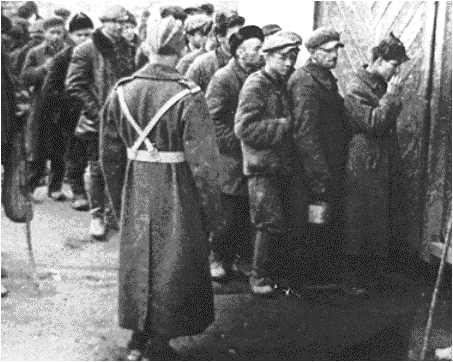Kotelok
 The occupants of my tent were a motley bunch, ranging in age from teenagers to grizzlies. All had drawn faces, beards at least a month old and tattered togs. And all were thin and starved. After a few introductory grunts, we curled up on the ground awaiting the announcement of our first mealtime. It came none too soon. The lineup to the kitchen where the soup was to be served and bread issued was long but orderly and patient. Those at the front, who peeked through the chinks between the boards of the wooden kitchen door, relayed the comforting or disturbing news to the rest of the queue:
The occupants of my tent were a motley bunch, ranging in age from teenagers to grizzlies. All had drawn faces, beards at least a month old and tattered togs. And all were thin and starved. After a few introductory grunts, we curled up on the ground awaiting the announcement of our first mealtime. It came none too soon. The lineup to the kitchen where the soup was to be served and bread issued was long but orderly and patient. Those at the front, who peeked through the chinks between the boards of the wooden kitchen door, relayed the comforting or disturbing news to the rest of the queue:"The soup looks thick."
"There may not be enough bread to give everybody their 450 grams."
"A staff seraeant is yelling at the kitchen hands, probably for stealing food."
"What d'ya mean probably? Sure they did! Bastards!"
A man in front of me was restless. He kept looking ahead as if to check the number of people in front of him, then cast glances at the people behind him, sometimes making half-steps to the side. I thought he was suffering from diarrhea and had to go, but was afraid of losing his place in the line. Another few minutes passed. Then he said, "I don't have a kotelok."
 This was serious in those days. A kotelok (the Russian diminutive for kettle) was indispensable for survival. It was a generic name for any pot, or can or bowl with a wire handle, or a jar with a string handle or anything to pour your water, soup, or kasha into. It was as important as one's hand. Nobody would lend or part with his kotelok even for a moment.
This was serious in those days. A kotelok (the Russian diminutive for kettle) was indispensable for survival. It was a generic name for any pot, or can or bowl with a wire handle, or a jar with a string handle or anything to pour your water, soup, or kasha into. It was as important as one's hand. Nobody would lend or part with his kotelok even for a moment.
The lineup started moving forward. The man was getting desperate. He didn't even have a cap or a hat to use as a bowl. I saw this being done in the camps many times. After a while the hat becomes coated inside with sticky food and does not leak any more. We were moving closer to the kitchen door. The man was in a panic, pleading in vain for help from everybody around him. Finally facing the solemn figure of the white-hatted chef who was holding the ladle like a wand of office, he lifted the hem of his greatcoat and fashioned from his coattails a creditable imitation of a tureen. Without blinking an eye the chef poured the prescribed two ladles of millet soup into it and turned to the next in line. He had seen it all before.
Aleksander Topolski
©2001, Steerforth Press